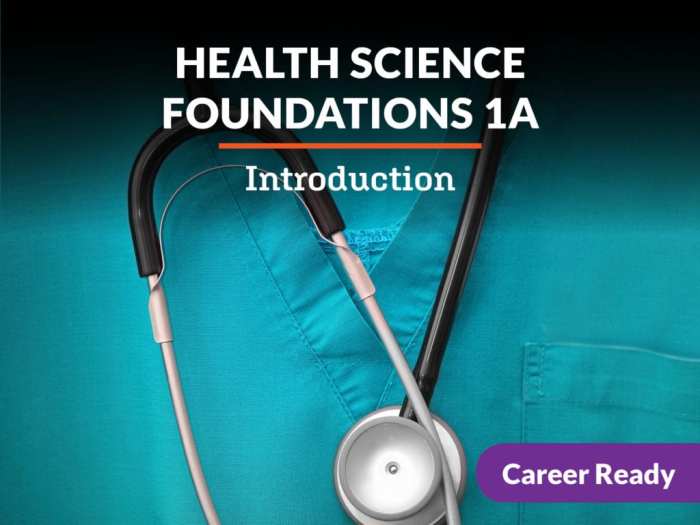Embark on a journey into the realm of hu10 foundations of health science, where the intricate tapestry of human health and well-being is unraveled. This comprehensive guide delves into the fundamental principles, historical evolution, and core disciplines that shape our understanding of health and disease.
Prepare to be captivated as we explore the human body, its intricate systems, and the factors that influence our overall health.
From the microscopic world of microorganisms to the complexities of pharmacology and disease, hu10 foundations of health science provides a holistic perspective on the science of healing. Discover the principles of nutrition and metabolism, the mechanisms of immunity, and the strategies employed to promote health and prevent disease.
As we navigate through this dynamic field, we will uncover the latest trends and advancements, shaping the future of healthcare and patient outcomes.
1. Health Science Foundations: Hu10 Foundations Of Health Science

Health science encompasses the study of the human body, its functions, and the diseases that affect it. It provides a foundation for understanding the principles and practices of healthcare, promoting health, and preventing and treating illness.
The historical evolution of health science has been marked by significant advancements in medical knowledge and technology. From the ancient practices of traditional healers to the modern era of evidence-based medicine, health science has played a crucial role in improving human health and well-being.
Health science encompasses a wide range of disciplines and subdisciplines, including:
- Anatomy
- Physiology
- Nutrition
- Microbiology
- Pharmacology
- Pathophysiology
- Epidemiology
- Public health
- Health promotion
- Health policy
- Ethics
2. Anatomy and Physiology
Anatomy is the study of the structure of the human body, while physiology is the study of its function. Together, these disciplines provide a comprehensive understanding of the human body and how it works.
The major organ systems of the human body include:
- Skeletal system
- Muscular system
- Nervous system
- Endocrine system
- Cardiovascular system
- Respiratory system
- Digestive system
- Urinary system
- Reproductive system
These organ systems work together in a complex and interdependent manner to maintain homeostasis and overall health.
3. Nutrition and Metabolism

Nutrition is the science of food and its relationship to health. It involves the study of how the body uses nutrients from food to support growth, repair, and energy production.
The metabolism of carbohydrates, proteins, and fats provides the body with the energy and building blocks it needs to function properly. The balance between energy intake and expenditure is essential for maintaining a healthy weight and preventing chronic diseases such as obesity and diabetes.
4. Microbiology and Immunology
Microbiology is the study of microorganisms, including bacteria, viruses, fungi, and parasites. These organisms can be harmful, beneficial, or neutral to human health.
Immunology is the study of the body’s defense mechanisms against infection. The immune system protects the body from harmful microorganisms by recognizing and destroying them.
5. Pharmacology and Therapeutics
Pharmacology is the study of drugs and their effects on the body. Therapeutics is the application of drugs to treat diseases.
Pharmacology and therapeutics are essential for the development and use of safe and effective medications to treat a wide range of health conditions.
6. Pathophysiology and Disease
Pathophysiology is the study of the mechanisms by which diseases develop and progress. It involves the investigation of the cellular and molecular changes that occur in the body during disease.
The understanding of pathophysiology is crucial for the development of effective treatments and preventive measures for diseases.
7. Epidemiology and Public Health
Epidemiology is the study of the distribution and determinants of health-related events in populations. Public health is the application of epidemiological principles to improve the health of populations.
Epidemiology and public health are essential for understanding the causes of diseases and developing strategies to prevent and control them.
8. Health Promotion and Disease Prevention
Health promotion is the process of enabling people to increase control over their health and improve their health status.
Disease prevention is the application of strategies to reduce the incidence and prevalence of diseases.
Health promotion and disease prevention are essential for improving the health of populations and reducing the burden of disease.
9. Health Policy and Ethics

Health policy is the development and implementation of laws, regulations, and programs that affect the health of populations.
Ethics is the study of right and wrong in the context of health science and healthcare.
Health policy and ethics are essential for ensuring that healthcare is fair, equitable, and accessible to all.
10. Future Trends in Health Science
The future of health science is characterized by emerging trends and advancements that have the potential to revolutionize healthcare.
These trends include:
- Precision medicine
- Artificial intelligence
- Regenerative medicine
- Nanotechnology
- Global health
These trends have the potential to improve the diagnosis, treatment, and prevention of diseases, leading to better health outcomes and a longer, healthier life for all.
Common Queries
What is the scope of hu10 foundations of health science?
hu10 foundations of health science encompasses a comprehensive understanding of human health and well-being, covering fundamental principles, historical evolution, core disciplines, and emerging trends in health science.
How does hu10 foundations of health science contribute to healthcare delivery?
hu10 foundations of health science provides a solid foundation for healthcare professionals, enabling them to understand the complexities of human health, disease processes, and evidence-based interventions to promote health and prevent disease.
What are the key disciplines within hu10 foundations of health science?
Core disciplines include anatomy, physiology, nutrition, microbiology, immunology, pharmacology, therapeutics, pathophysiology, epidemiology, public health, health promotion, disease prevention, health policy, and ethics.